Rules
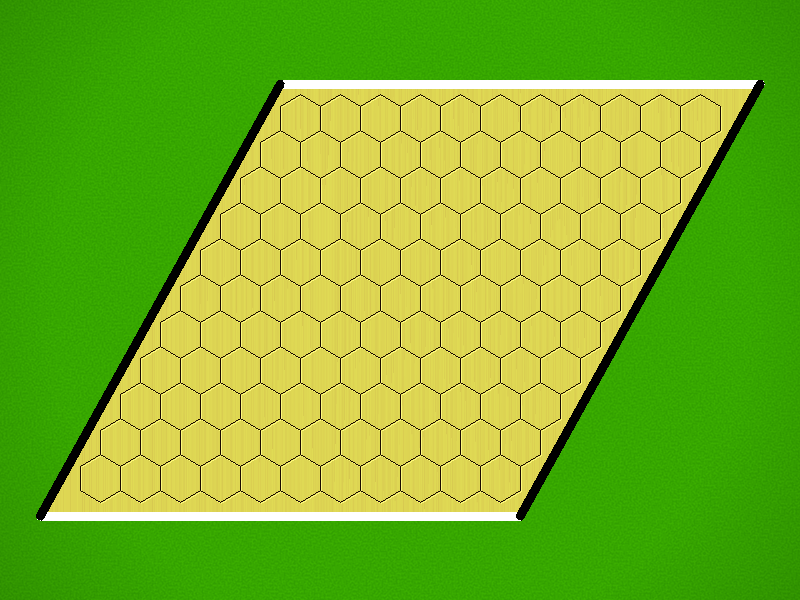
Representative game (in the sense of being of mean length). Wherever you see the 'representative game' referred to in later sections, this is it!
Place a piece. Connect opposite sides.
Possibly the simplest deep game ever invented
Generated at 6/12/23, 5:24 PM from 875 logged games.

Representative game (in the sense of being of mean length). Wherever you see the 'representative game' referred to in later sections, this is it!
Place a piece. Connect opposite sides.
General comments:
Play: Combinatorial
Mechanism(s): Connection
| BGG Entry | Hex |
|---|---|
| BGG Rating | 6.69604 |
| #Voters | 792 |
| SD | 1.86999 |
| BGG Weight | 3.2065 |
| #Voters | 92 |
| Year | 1942 |
| User | Rating | Comment |
|---|---|---|
| amatyarakshasa | 10 | A simpler version of Twixt. So simple and so hard. Defense = Offense = Defense. A totally awesome game. |
| rauwolfa | 9.9 | |
| eljo | 7 | 1990 HOM |
| mrraow | 10 | Beautifully simple connection game. Flawed, in that a pie rule is necessary to offset the first player advantage, but full of surprises. |
| jrsquee | 10 | 2022/04: it's a classic for a reason. elegant, emergent, excellent. |
| Arctic Jack | 8 | Attic Box #2 14x14 Hex seems to give you a little breathing room but still probably only between evenly matched players. If not, 14x14 is just prolonging the inevitable. |
| bayspiel | N/A | 08.04.01.01 |
| dafair | 8 | Mine is homemade set - Go stones on a Chessex mat. |
| dosxtres | 9 | |
| drewillini | 9 | Playing this game may forever lower your tolerance for gratuitously complicated game mechanics. THIS is how simple a game can be. Take turns placing stones until two sides connect, and they WILL, which is somehow obvious and counterintuitive at the same time. If the gameplay is deep enough for John Nash, it's deep enough for you. |
| cannoneer | 6 | I don't like the swap rule in games. I respect this design but it's not something I clamor to play. If there's nothing else going on on IG Game Center I'll sometimes jump into a game of this. I'm not very good, and maybe the rating will increase with more play. At least it's very simple to learn! |
| fhsIV | 9 | |
| danky | 1 | homemade. buggy game, it have an easy winning strategy |
| dolzandavid | 5.5 | A connection game, inferior to Twixt by a country mile. |
| adamscott | 7 | Might be the easiest game ever made to teach/learn, but has lots of depth. Go players will pick this game up very quickly. It feels like a lighter version of Go to me. |
| autocorr | 9 | My favorite modern "abstract" game and example of strategic depth developing from simple, elegant rules. [url=http://www.mseymour.ca/hex_book/hexstrat.html]Hex: a Strategy Guide[/url] by Matthew Seymour is an incredible resource and fully interactive. It is a true gift to the player community. The main weakness I've found with Hex over-the-board is that it is (a) difficult to handicap and (b) novice players have a difficult time learning from handicap games. Hex is a very decisive game, and a brain-dead strategy can be insurmountable with only a few stone advantage. |
| Altugas | N/A | (Not played yet). |
| birdbolter | 5 | This game was immensely amusing to me in my first dozen plays, less so now. |
| jeep | 9 | |
| Stephen Glenn | 9 | Homemade copy |
| hikwaitek | 10 | |
| Aiken Drum | 8 | If you like abstract strategy games, you will probably know this game. It's very deep and one of the simpliest games in terms of rules out there. --May 07 |
| Boy_314 | 2 | bad abstract game. first player advantage is EXTREMELY noticeable. |
| emike | 7 | Classic. |
| The Nerdy Girl | 10 | |
| Mark131312 | 10 | |
| donkst | N/A | 3M Paper Version |
| LukeJS | 10 | Hex is an incredibly elegant game that is far deeper than it first appears to many gamers. |
| matthulgan | 10 | The ideal abstract. |
| Songok | 10 | Very easy to learn, not sure about mastering it eheh Love the pie rule at the start |
| Pionek | 9 | |
| 2d20 | 6 | PnP Not my preferred style of Abstract, but would still play occasionally. |
| davidme | 6.9 | "Own" in The Book of Classic Board Games by Sackson. |
| Draxonfly | 4 | *garden* |
| aslaksen | 7 | Classic abstract! |
| simpledeep | 10 | |
| Schachtelhalm | 9 | One of the most brain-training abstract games with the simplest rules. So I should give it a 10. Personally, I just prefer to play the Hex variant [gameid=34221] instead. |
| gabriel_k | 10 | |
| Tesruni | 10 | |
| pasxalis1987 | 10 | |
| nickmoniker | 10 | Very likely, Hex is my favorite game of all time. It's certainly in my top five. |
| 4characters | 5 | For such a simple game it can be difficult to play well. At first glance you might be tempted to think it's as simple as tic-tac-toe, but it's surprisingly deep. |
| Calpurnio | 7 | Played over the web. Nice abstract |
| ampelman | 10 | |
| BobDodgerBlue | N/A | 876 |
| thelegendarybeng | 10 | This game fits the "seconds to learn, years to master" description to the maximum level. This game has so so much depth despite being so quick, and I still am finding new strats to use over 7 years after first learning it. Every gamer should try this game out. |
| Dingus | N/A | 3M paper pad version and wooden marble version |
| HexNash | 10 | |
| El Diabolo | 8.5 | This game is bizarrely subtle. Like go, without serious study, looking at a board does not convey the spirit between the players. |
| bcnevan | 4 | Hex provides a rule set about as bare bones as you can get. Emerging from that sparse rule set is a deep game of positional understanding. This often manifests itself in the feeling that Hex is a game of positional chicken that can end upon the first observed error. Now that game of chicken has depth, but that depth is shared by many, many abstract games. Hex requires you to constantly analyze the board state, shift your connection goal in view of that understanding, and also work to block your opponent's apparent connection goal. For the standard 11x11 board, the relatively small number of placement positions combined with the static end-game goal seem to cause the placement of the first piece (with equally skilled players) to be highly influential to the game's outcome. At the least, Hex's implementation requires the player that places the second piece to avoid isomorphic placements and to more readily take advantage of the other player's mistakes. A larger board (e.g., 14x14) would seem to make the computations more difficult, but the issue is pretty baked in, so we're really just discussing how far down it gets buried below the difficult calculations. For at least these considerations, Hex seems pretty low on the list of abstracts that I would want to devote a large amount of time to. For even just connection games, Twixt, Slither, and Havannah seem much more worthy of long-term investment. Sometimes a simple ruleset is too simple and results in a system that is not robust enough. [update] played it some more; and even the positional puzzles become less interesting. Positional chicken; rote call-and-response play; etc. I can confirm the gist of my original comment. Outside of Hex, there are much more interesting abstract games out there. |
| dalton-almeida | N/A | PnP |
| The Player of Games | 9.09 | Print and play board. Stones from [thing=11997] [/thing]. Excellent connection game! One of the purest and simplest abstract games from a rules perspective. Just connect your two sides of the board by playing one stone at a time in the cells of the hex grid, and you win. However, deep and feels like a "knife fight in a phone booth" (or "in a wardrobe" now cell phones make phone booths go extinct). |
| DalimThor | 6 | it's quick and easy to learn. |
| Getzen | 9 | Hex (and its cousins Y and Unlur) is a beautifully simple game -- the rules are no more complex than tic-tac-toe -- with tantalizingly deep gameplay, especially on larger boards (say 11x11 on up). Easily learned and played by youngsters too. It might seem dry to most gamers, but for abstract lovers it doesn't get much better. See Unlur, Havannah, Twixt, or even Punct for games with a similar connection theme, but which are a little higher on the fun factor. |
| birdsong703 | 6 | [microbadge=34746] Can recommend the PnP for flights and train rides. |
| drunkenKOALA | 10 | Simple and beautiful. Great strategical depth that may rival even that of Go's. [url=http://www.boardgamegeek.com/article/1070318#1070318]My favorite game.[/url] I think hundreds of years from now, Hex will hold the same place that Go does now. |
| CarlosLuna | 10 | |
| Mingy Jongo | 9.8 | One of the greatest perfect-information games of all time. |
| cackleton2 | 10 | Hex is a wonderful game of surprises, tension, witfulness, the long journey of improvement and insight that absorbs those who take it. Join the Hex discord server: https://discord.gg/Rj37fuw |
| aionman | 9 | Comparable depth and excitement to Go but can be played in less than an hour. Would like to buy wooden board and pieces with 11 X 11 on one side and 13 X 13 on the other side. |
| byturn | 6 | the pure connection game. |
| cdunc123 | 9.25 | An elegant game with tremendous depth. The rules are nearly as simple as can be. And I like the decisive win condition (no counting up scores). Not a perfect 10 because it needs the swap rule to balance it. One other downside is that you can lose the game in, say, the third move without realizing it. That can be frustrating for beginners. But once you learn to prevent the early losses, the game starts to shine. And to learn to avoid early losses, all you need to do is read and understand [url=https://boardgamegeek.com/article/20527868#20527868]this brief tutorial. [/url] |
| chriskaspar | N/A | Would love to make my own version of this game. |
| Anakin1981 | 5 | Decent abstract game with very easy rules to teach and play but not exactly my cup if tea... |
| Kasimuzz | 10 | Maybe the best ever game! |
| r4t4t0sk | 10 | |
| struggler1 | 10 | |
| bugTrap | N/A | Various online versions. 20+ plays. Probably the simplest abstract game I've ever played. Drawless, no possibility of stalemate, recursion or other ambiguous positions. Playable at all sizes, with new shapes and strategies becoming available on bigger boards. Would not have imagined enjoying it this much. |
| camb | 10 | This is to my mind the ultimate game: among the simplest rules of any game, but among the deepest to play. I've played it for many years now, and every game still seems to throw up new situations and problems to solve. Great stuff. |
| nestorgames | 9 | Publisher ;-) The perfect abstract. |
| filou | 9 | One of the pioneering connection game, and still one of the best. The rules look so natural, the use of an hex board too... It looks like this game should have been invented 2000 years ago. It's not that strange that it was independantly invented by two different persons. |
| epicgamer | 7 | I like this abstract connection game. I think I should try out some others like it. |
| Fenriz | 4 | I prefer Twixt. |
| dancingdanslc | 4 | DIGITAL PLAY: iPad Air Connect sides by placing tokens one at a time. Boring Out of my collection |
| fiddly_bits | N/A | Homemade Nash set(s) in several of the traditional sizes. |
| takeoutweight | 10 | I wish there was thousands of years of analysis backing this game, it would be fun to study. I find the geometric pattern matching and reading of long forcing continuations fun. It's always a dramatic game. Eg even Go can come down to a find-pennies-in-the-couch-cushions endgame. Not hex. |
| dysjunct | 4 | Mediocre. Another boring abstract. |
| ctalbot | 5 | This abstract doesn't have much to offer. It's not fun. |
| Erniepaul | N/A | ? |
| jg27 | 10 | If the ratio of strategic depth to rule complexity is the measure of a game, then hex may be the best game ever created. Games are typically short and sweet (or bitter), and it's impossible for players to draw. You don't need to worry about cycles like in chess or go. I see some users complaining that the game is shallow and the first player has an easy win. If this were the case there wouldn't be a Hex Research Group at University of Alberta :) Just make sure you play on a board of at least 11x11, and start with the swap/pie rule. |
| Deleted010518 | 9 | There's a lot of complexity in here. From 'splitting the pie' fairly at the start, to blocking sensibly to progressions like Go's ladders... and there's undoubtedly a lot more that I've not yet uncovered. |
| DornianCollection | N/A | Russell |
| Punainen N�rtti | 10 | |
| AnttiR | 9.63 | |
| verandi | 9 | THE classic connection game and the best I've played. |
| big_buddha | 7 | Very simple, very deep, and has that special something that just makes it pleasant to play |
| ChristianDK | 6 | Rules don't get any simpler than the rules for Hex yet the game is deep. A very strategic game. |
| halladba | 10 | |
| bucklen_uk | 6 | Elegant abstract - but there are many more 2 player games I'd rather play. |
| Friendless | 9 | I think I play at an intermediate level now, but I have lots to learn. It's hard to find a regular opponent, so I wrote a Facebook app to play on. http://apps.facebook.com/hexgame/ With more experience I still find the game to be exceedingly dry. In an abstract game like Chess or Go a move can still have character, e.g. be an aggressive attack or a nervous defence. In Hex a move is just a move, and I don't see any passion in the play. The game is also unforgiving. On an 11x11 board a bad move can spell doom. In many other games there's time to fight back, but in Hex you can put yourself into a losing position and spend a long time doomed without realising it. I will continue playing but the game is not showing me the hidden beauty I had hoped for. There's a downloadable AI opponent called Hexy which plays a very good game. In fact it's too good - I can't beat it on even the easiest level so I find it very very boring and unhelpful. |
| fantum | 10 | Very, very, very, very good. |
| cultb | N/A | #boardspace #BGA #IOS #Android |
| szabog | 10 | |
| RDReilly | 9 | Simple, deep, beautiful. Made two wooden boards for myself. |
| bootleby | 10 | |
| morphles | 10 | Rich gameplay from very simple rules. In this regard I doubt you get more bang for a buck! Very good game. |
| Akeem | 6 | I have tremendous respect for what this game is, what this game has spawned, and what this game takes to play it well. I just do not find it fun (maybe it's an innate prejudice against diamond shaped boards or some other ridiculous reason). There are other connection games out there with a similar feel that are far more interesting to me (e.g. Mind Ninja, Gonnect, *Star) that I would much rather spend my time on. |
| donaldrnelson | N/A | W |
| Brederic | N/A | @ BGA |
| twixter | 10 | I've played over a thousand Hex games on the Internet. I hope to play thousands more. |
| bekudno | 10 | I am a huge fan of the pure connection game genre, and Hex is the only such game I've played much of. Pure connection games have an amazing elegance that I've never seen matched anywhere else. They are also deceptively deep. I'm good enough at Hex to understand that I could study it for many years and keep finding new insights. The largest board I've played on is 13x13, but I have a feeling that 19x19 Hex is to 11x11 Hex as 19x19 Go is to 9x9 Go, i.e. almost a different game with all the layers of strategy it adds. I believe that Hex and related pure connection games are around for the long haul, and that by the standards of a few hundred years from now, the current best players in the world are beginners. I like to play at www.littlegolem.net |
| Tony van der Valk | 10 | www.hexboard.com |
| ensor | 7 | Must play with pie rule. Simple rules yet challenging underneath, like dots and boxes. |
| n0v4___ | 10 | |
| darker | N/A | [Own a hex-battlemat suitable for play, not published edition] Entertaining. Only played once or twice - some reminiscinces of Go, some completely different dynamics. Enjoyed. |
| bothros | 10 | |
| megamau | 9 | The greatest complexity in relation to the rules. It can literally be explained in 30 sec., but it is full of tactics and strategy. |
| Butsudoka | 7 | Please see [url=http://www.boardgamegeek.com/thread/1166936/a-wicked-and-seductive-witch]my review[/url]. I've been less interested in playing this game since I found Havannah, which I think is a more stimulating and entertaining game. |
| AdamMcD | 6 | Great strategy, but games that rely only upon dots, boxes, lines, etc. (hexegons in this case) always seem cold and formal - takes the fun out of it. |
| Josemastill | 10 | |
| Adyry | 10 | |
| artyomch | 9 | |
| familywontplay | 5.5 | The first person advantage is too great. |
| rayzg | 9 | Homemade version -- plastic sheet protector, printout, and dry-erase markers. Make sure you play this with very large boards, like 19x19. |
| aarondesk | 7.5 | #to-play |
| Chironis | 9 | 2 player |
| mynameiswillem | 10 | |
| demongod | N/A | Printed |
| enzodog | 6.6 | Played on 11x11 board, would like to try on 14x14. |
| mzmzmz | 10 | This is an awesome abstract game, easily my favorite. |
| upike | 10 | In or around Vilnius and want to play? Send me a PM! ----- The most elegant and one of the most engaging games I've encountered so far. Perhaps Game of Y is more elegant by a tiny margin, but it requires huge boards to be interesting. For all its apparent dryness, Hex plays incredibly wet and tense. Crazy to think that it wasn't invented until mid-XX century, as it has this timeless, universal elegance about it. One of its advantages, as opposed to Go and many other classic abstract games, is how easy is to introduce this game and have new players immediately, intuitively seeing what to do and testing their intuitions. Go, while its rules are short and clear, suffers from newbies not knowing how to get there, how to surround, where to start on an empty board, not to mention the square grid and stones not connecting diagonally, which takes many games to get used to, due to how our visual perception works. _____ 2023 update: still my favorite, only perhaps rivaled by Shogi which I play more often due to larger amount of opponents available. The only slight drawback I can think of is the lack of graded handicap system. When introducing the game, I either allow the newbie to go first without swapping and let him lose badly several times while explaining basic concepts, or (especially on big boards) allow the opponent several starting moves in a row until I feel our chances have been matched if I swap his last move. Immortal, uber-elegant game with a very unique feel to it. |
| clayhaus | 9 | Simple. Elegant. Classic. |
| Mastergame82 | 10 | |
| rorschah | 10 | |
| pled | 9.5 | |
| rsb762gm | 10 | |
| Dada77 | 9 | Few rules, infinite strategies. |
| ed_in_play | N/A | printed rhombus shaped board 11x11 Hex to use with go pieces or pieces from two Othello sets |
| millish | 10 | |
| jmastill | 10 | |
| psikonauta | 10 | |
| BoardGameGeek42 | N/A | BGA |
| gmoralesor | 10 | |
| XMJA | 10 | |
| DSeagraves | 7 | Great abstract game. Very challenging. |
| chaosbreaker | 7 | Simple rules yet a complex game. Own a laser printed board on a self adhesive, vinyl bathroom tile that I bought from a hardware store. |
| T0afer | 10 | You won't find a more elegant game except maybe the game of Y (which is just not as good imo). The rules of Hex are so simple its crazy. They're literally just "connect your side." Somehow this ends up creating a game of immense depth, especially on boards larger than the 11x11 beginner board. It may not be the flashiest of abstracts, but if you give it some effort its worth a great deal more than most of them in breadth and depth. A lot of beginners make the mistake of trying to simply march their pieces across the board placing them next to each other and hoping their opponent can't deal with initiative they've seized. Its a recipe for disaster, given how easily a non-beginner can block, and is likely one of the reasons a lot of people are ambivalent about Hex after one or two plays. Hex is a brutal fight for territory in order to secure "virtual connections" where you create multiple ways of connecting that can't be blocked by the opponent on a single turn (and so effectively can't be blocked). The simplest virtual connection is a "bridge" where you place two stones hexadiagonally adjacent to each other, allowing you two ways to connect your two stones in case of an attempted block, while simultaneously covering more ground than simply placing stones adjacent. Between virtual connections, tactics such as ladders, ladder breaks, seizing territory through intrusions into opponent's virtual connections, and blocks Hex is a deep and rewarding game. Don't be discouraged in trying it out. It shares some similarity with Go in that you may well lose 100 games before you start being able to wield all the bells and whistles it has to offer effectively (and seems to be very true based on Board Game Arena beginner records). As an aside, I've seen a lot of concern over player imbalance in Hex, but the pie rule genuinely fixes the problem. Matthew Seymour, a high level player and author of a fantastic strategy guide, recently collected a bunch of data from high level games on the various board sizes and found that the win ratio of red/blue (white/black) is either 50-50 or about 49-51 for all board sizes except the 13x13 board where the very highest level AI's have a win ratio of 43% to 57% (for everyone else it's about 50-50 as well). Hex with the pie rule, is effectively more balanced than chess. So don't let rumors of it being broken deter you. I'll also add that I greatly prefer the 15x15 board to the 11x11 board. I Haven't done much on the 13x13 or the 19x19 board, but I suspect I would still favor the 15x15 board over the 13x13 given how often strategic considerations and tenuki (like in Go) come into play compared to the few games on 13x13 I did play. |
| criss_mcs3 | N/A | Abstract game of connecting with deep tactics and strategy. The swap rule is useful to minimize the first player advantage. Homemade 13x13/11x11 copy in progress using GO pieces and a board. |
| DanielBeaver | 8 | Very simple, deceptive depth. It requires a bit of coaching for new players, or else they will flounder around without discovering the basic tactics, but this is a relatively small hump compared to other abstracts. |
| dispatch134711 | 9.4 | From one rule springs endless delight. The simplest and purest of all abstracts. The most mathematical and one of the most difficult. Connect two sides of a hex board. Discovered by two different mathematicians, Hex is truly a universal game. Even a child could tell if the game was won. If extraterrestrial intelligence exists, they play this game. On larger boards, its depth will rival Go itself. Fascinating. Most computer programs are rubbish. A windows program "Hexy" presents a stiff challenge, but only on 11x11. This is the size at which computers will eventually overwhelm humans (if they haven't already). Luckily, moving up to a bigger board is always an option. |
| clark94 | 7 | Simple game, which explains why it is so difficult. If you make a mistake early it is often irrecoverable. |
| aaronseeber | 6 | A classic, but a bit too dry for my taste. |
| Hexer | 10 | |
| ypercube | 10 | |
| amortera | N/A | |
| alekerickson | 10 | |
| CDRodeffer | 8 | Beautifully simple abstract connection game. If you don't already have it, Cameron Browne's book on this game is excellent. |
| mxpf | 10 | My favorite 2-player classic abstract. |
| Chris Sjoholm | 9 | |
| pleclenuesse | 10 | |
| ludopath | 10 | I used to respect this game from a safe distance (first attempts, many years ago, seemed to point to a certain dryness), until the covid crisis made me revisit it at littlegolem. It didn't take many games for me to realise how wrong that earlier first impression had been. Hex not only can be short and brutal (that I did know), but also very beautiful and even dramatic. If you like luck-free 2-player abstracts at all, you should give this game more than a casual look. (For the full experience, boards should be at least 13x13, in my opinion.) |
| MorrisKind | 10 | |
| ddyer | 8 | More than a mathematical curiosity. Go players will find the positional and pattern matching pretty familier. |
| Gruff Mckenzie | 9 | simple and superb... |
| AmassGames | 4 | Too basic and odd: even approach |
| Scrabblette | 9 | |
| Quadell | 9 | I usually play this on a homemade board with makeshift pieces. In my opinion, this is the world's best abstract strategy game, both perfectly simple and magnificently complex. |
| Hjallti | 9 | Great game |
| abstractgamesfan | 8 | Hex is an old connection game invented in 1942 by mathematicians. The rule is very simple but very deep. Valuable details on the page https://fr.wikipedia.org/wiki/Hex |
| Bob Waters | 9 | Simple. |
| D Beau | 7.5 | I've always been under the impression that I didn't enjoy connection games, but playing Hex has brought that into question. Perhaps I simply couldn't grasp the fundamental concepts of the genre until I saw them boiled down to their essence. With Hex, there's a great clarity, which was missing for me in games like Punct or Twixt. Regardless, my few games so far have been very fun and exciting, and I look forward to playing more. |
| Panglott | 10 | Such a fascinating game, so simple and yet so much interest. I would love to play this more. |
| adebisi | 3 | One of those classic games that are simple but ingenious, like tic-tac-toe. However, after playing once I just don't want to play again. |
| drbobjack | 8 | Hex is the ultimate connection game, and possibly the abstractest abstract. On a theoretical level, the way very simple rules create something that works so well is fascinating. But Hex is more than a cool theoretical construct -it's incredibly sharp and interesting to play. The back and forth of cuts, early plays to gain control of areas, figuring out just where to play your stones -it's brilliant. And in a game that can be taught in 10 seconds! It's not the most exciting game, admittedly, and it can be difficult for new players to "get". You can play it with them, giving them stones as a handicap, but it's probably not the best introduction to abstracts. And as a placement game, positions can feel a little static. Still, Hex is a fantastic game that should be played by anyone who's interested in abstracts. |
| MikeRUS | 10 | |
| Necrolic | 10 | |
| epicurus | 10 | |
| Destov | N/A | One of the most elegant games |
| HrFrosk | 10 | |
| Checkallday | 7 | I'm still learning but I like Twixt better. |
| almo2001 | 8 | I have the nestorgames 14x14 portable edition. Great game! |
| tkvaran | 9.5 | |
| Thrift Thopter | 10 | |
| gwylim | 10 | Probably my favorite game. The rules are very simple, but the strategy is far from trivial. Only play online. |
| wtanaka | 9 | http://games.wtanaka.com/hex |
| boomtron | 8 | The most basic connection game. But, that just allows the decisions to boil to their essence. Great. |
| Tiwsman | 10 | |
| bluebee2 | N/A | PnP |
| bop517 | N/A | Pen and Paper 3M game. |
| Apple Paul | 5 | A basic abstract game without much gaming excitement. Feels like an experiment in math theory at best I suppose. |
| ExcellentRaven | 7 | great training for Go, and good game on its own to boot! |
| FiveStars | 10 | One of the best games ever invented. Was called "Polygon" by its Danish inventor, the poet Piet Hein, and "Nash" by John Nash, winner of the Nobel Prize. |
| qswanger | 10 | Quintessential connection game. |
| aprolepsis | 9 |
| Size (bytes) | 30177 |
|---|---|
| Reference Size | 10673 |
| Ratio | 2.83 |
Ai Ai calculates the size of the implementation, and compares it to the Ai Ai implementation of the simplest possible game (which just fills the board). Note that this estimate may include some graphics and heuristics code as well as the game logic. See the wikipedia entry for more details.
| Playouts per second | 78032.95 (12.82µs/playout) |
|---|---|
| Reference Size | 562841.22 (1.78µs/playout) |
| Ratio (low is good) | 7.21 |
Tavener complexity: the heat generated by playing every possible instance of a game with a perfectly efficient programme. Since this is not possible to calculate, Ai Ai calculates the number of random playouts per second and compares it to the fastest non-trivial Ai Ai game (Connect 4). This ratio gives a practical indication of how complex the game is. Combine this with the computational state space, and you can get an idea of how strong the default (MCTS-based) AI will be.

% new positions/bucket
| State Space Complexity | 70018054 | |
|---|---|---|
| State Space Complexity bounds | 64132659 < 70018054 < ∞ | |
| State Space Complexity (log 10) | 7.85 | |
| State Space Complexity bounds (log 10) | 7.81 <= 7.85 <= ∞ | |
| Samples | 608991 | |
| Confidence | 0.00 | 0: totally unreliable, 100: perfect |
State space complexity (where present) is an estimate of the number of distinct game tree reachable through actual play. Over a series of random games, Ai Ai checks each position to see if it is new, or a repeat of a previous position and keeps a total for each game. As the number of games increase, the quantity of new positions seen per game decreases. These games are then partitioned into a number of buckets, and if certain conditions are met, Ai Ai treats the number in each bucket as the start of a strictly decreasing geometric sequence and sums it to estimate the total state space. The accuracy is calculated as 1-[end bucket count]/[starting bucklet count]
| Label | Its/s | SD | Nodes/s | SD | Game length | SD |
|---|---|---|---|---|---|---|
| Random playout | 98,534 | 881 | 10,593,869 | 95,211 | 108 | 11 |
| search.UCT | 166,024 | 3,670 | 36 | 10 |
Random: 10 second warmup for the hotspot compiler. 100 trials of 1000ms each.
Other: 100 playouts, means calculated over the first 5 moves only to avoid distortion due to speedup at end of game.
Rotation (Half turn) lost each game as expected.
Reflection (X axis) lost each game as expected.
Reflection (Y axis) lost each game as expected.
Copy last move lost each game as expected.
Mirroring strategies attempt to copy the previous move. On first move, they will attempt to play in the centre. If neither of these are possible, they will pick a random move. Each entry represents a different form of copying; direct copy, reflection in either the X or Y axis, half-turn rotation.
| 1: Player 1 (White) win % | 48.46±3.30 | Includes draws = 50% |
|---|---|---|
| 2: Player 2 (Black) win % | 51.54±3.31 | Includes draws = 50% |
| Draw % | 0.00 | Percentage of games where all players draw. |
| Decisive % | 100.00 | Percentage of games with a single winner. |
| Samples | 875 | Quantity of logged games played |
Note: that win/loss statistics may vary depending on thinking time (horizon effect, etc.), bad heuristics, bugs, and other factors, so should be taken with a pinch of salt. (Given perfect play, any game of pure skill will always end in the same result.)
Note: Ai Ai differentiates between states where all players draw or win or lose; this is mostly to support cooperative games.
| Match | AI | Strong Wins | Draws | Strong Losses | #Games | Strong Score | p1 Win% | Draw% | p2 Win% | Game Length |
|---|---|---|---|---|---|---|---|---|---|---|
| 0 | Random | |||||||||
| 2 | UCT (its=3) | 631 | 0 | 306 | 937 | 0.6427 <= 0.6734 <= 0.7027 | 49.09 | 0.00 | 50.91 | 105.64 |
| 10 | UCT (its=11) | 631 | 0 | 356 | 987 | 0.6089 <= 0.6393 <= 0.6687 | 47.72 | 0.00 | 52.28 | 103.75 |
| 20 | UCT (its=21) | 631 | 0 | 302 | 933 | 0.6456 <= 0.6763 <= 0.7056 | 45.66 | 0.00 | 54.34 | 103.38 |
| 28 | UCT (its=29) | 631 | 0 | 367 | 998 | 0.6019 <= 0.6323 <= 0.6616 | 46.49 | 0.00 | 53.51 | 101.48 |
| 36 | UCT (its=37) | 631 | 0 | 332 | 963 | 0.6247 <= 0.6552 <= 0.6846 | 43.30 | 0.00 | 56.70 | 100.55 |
| 44 | UCT (its=45) | 631 | 0 | 334 | 965 | 0.6233 <= 0.6539 <= 0.6832 | 47.05 | 0.00 | 52.95 | 98.89 |
| 52 | UCT (its=53) | 631 | 0 | 369 | 1000 | 0.6006 <= 0.6310 <= 0.6604 | 44.50 | 0.00 | 55.50 | 97.45 |
| 62 | UCT (its=63) | 631 | 0 | 364 | 995 | 0.6038 <= 0.6342 <= 0.6635 | 41.91 | 0.00 | 58.09 | 96.19 |
| 76 | UCT (its=77) | 631 | 0 | 366 | 997 | 0.6025 <= 0.6329 <= 0.6623 | 43.53 | 0.00 | 56.47 | 93.68 |
| 90 | UCT (its=91) | 631 | 0 | 364 | 995 | 0.6038 <= 0.6342 <= 0.6635 | 44.72 | 0.00 | 55.28 | 92.50 |
| 113 | UCT (its=114) | 631 | 0 | 327 | 958 | 0.6281 <= 0.6587 <= 0.6880 | 45.09 | 0.00 | 54.91 | 89.16 |
| 121 | UCT (its=329) | 631 | 0 | 10 | 641 | 0.9715 <= 0.9844 <= 0.9915 | 49.61 | 0.00 | 50.39 | 80.14 |
| 122 | UCT (its=894) | 631 | 0 | 24 | 655 | 0.9461 <= 0.9634 <= 0.9753 | 50.23 | 0.00 | 49.77 | 61.79 |
| 123 | UCT (its=2430) | 631 | 0 | 25 | 656 | 0.9443 <= 0.9619 <= 0.9741 | 49.54 | 0.00 | 50.46 | 47.26 |
| 124 | UCT (its=6606) | 631 | 0 | 75 | 706 | 0.8689 <= 0.8938 <= 0.9144 | 51.84 | 0.00 | 48.16 | 36.81 |
| 125 | UCT (its=6606) | 499 | 0 | 501 | 1000 | 0.4681 <= 0.4990 <= 0.5299 | 49.90 | 0.00 | 50.10 | 38.56 |
Search for levels ended: time limit reached.
Level of Play: Strong beats Weak 60% of the time (lower bound with 95% confidence).
Draw%, p1 win% and game length may give some indication of trends as AI strength increases.

This chart shows the win(green)/draw(black)/loss(red) percentages, as UCT play strength increases. Note that for most games, the top playing strength show here will be distinctly below human standard.
| Samples | 875 | Quantity of logged games played |
|---|
Computational complexity (where present) is an estimate of the game tree reachable through actual play. For each game in turn, Ai Ai marks the positions reached in a hashtable, then counts the number of new moves added to the table. Once all moves are applied, it treats this sequence as a geometric progression and calculates the sum as n-> infinity.
| Board Size | null | Quantity of distinct board cells | ||||||||||||||||||||||||||||||||||||||||||||||||||||||||||||||||||||||||||||||||||||||||||||||||||||||||||||||
|---|---|---|---|---|---|---|---|---|---|---|---|---|---|---|---|---|---|---|---|---|---|---|---|---|---|---|---|---|---|---|---|---|---|---|---|---|---|---|---|---|---|---|---|---|---|---|---|---|---|---|---|---|---|---|---|---|---|---|---|---|---|---|---|---|---|---|---|---|---|---|---|---|---|---|---|---|---|---|---|---|---|---|---|---|---|---|---|---|---|---|---|---|---|---|---|---|---|---|---|---|---|---|---|---|---|---|---|---|---|---|---|---|
| Distinct actions | null | Quantity of distinct moves (e.g. "e4") regardless of position in game tree | ||||||||||||||||||||||||||||||||||||||||||||||||||||||||||||||||||||||||||||||||||||||||||||||||||||||||||||||
| Mean change in material/round | 0.96 | Complete round of play (all players) |
|---|
This chart is based on a single representative* playout, and gives a feel for the change in material over the course of a game. (* Representative in the sense that it is close to the mean length.)

Table: branching factor per turn, based on a single representative* game. (* Representative in the sense that it is close to the mean game length.)

This chart is based on a single representative* game, and gives a feel for the types of moves available throughout that game. (* Representative in the sense that it is close to the mean game length.)
Red: removal, Black: move, Blue: Add, Grey: pass, Purple: swap sides, Brown: other.

This chart shows the best move value with respect to the active player; the orange line represents the value of doing nothing (null move).
The lead changed on 15% of the game turns. Ai Ai found 10 critical turns (turns with only one good option).

This chart shows the relative temperature of all moves each turn. Colour range: black (worst), red, orange(even), yellow, white(best).
| Measure | All players | Player 1 | Player 2 |
|---|---|---|---|
| Mean % of effective moves | 4.32 | 6.83 | 1.82 |
| Mean no. of effective moves | 3.86 | 5.95 | 1.77 |
| Effective game space | 10^12.68 | 10^8.24 | 10^4.44 |
| Mean % of good moves | 4.92 | 4.15 | 5.69 |
| Mean no. of good moves | 4.64 | 4.64 | 4.64 |
| Good move game space | 10^12.36 | 10^7.70 | 10^4.66 |
These figures were calculated over a single game.
An effective move is one with score 0.1 of the best move (including the best move). -1 (loss) <= score <= 1 (win)
A good move has a score > 0. Note that when there are no good moves, an multiplier of 1 is used for the game space calculation.
| Measure | Value | Description |
|---|---|---|
| Hot turns | 97.73% | A hot turn is one where making a move is better than doing nothing. |
| Momentum | 27.27% | % of turns where a player improved their score. |
| Correction | 38.64% | % of turns where the score headed back towards equality. |
| Depth | 2.72% | Difference in evaluation between a short and long search. |
| Drama | 1.52% | How much the winner was behind before their final victory. |
| Foulup Factor | 15.91% | Moves that looked better than the best move after a short search. |
| Surprising turns | 4.55% | Turns that looked bad after a short search, but good after a long one. |
| Last lead change | 86.36% | Distance through game when the lead changed for the last time. |
| Decisiveness | 6.82% | Distance from the result being known to the end of the game. |
These figures were calculated over a single representative* game, and based on the measures of quality described in "Automatic Generation and Evaluation of Recombination Games" (Cameron Browne, 2007). (* Representative, in the sense that it is close to the mean game length.)
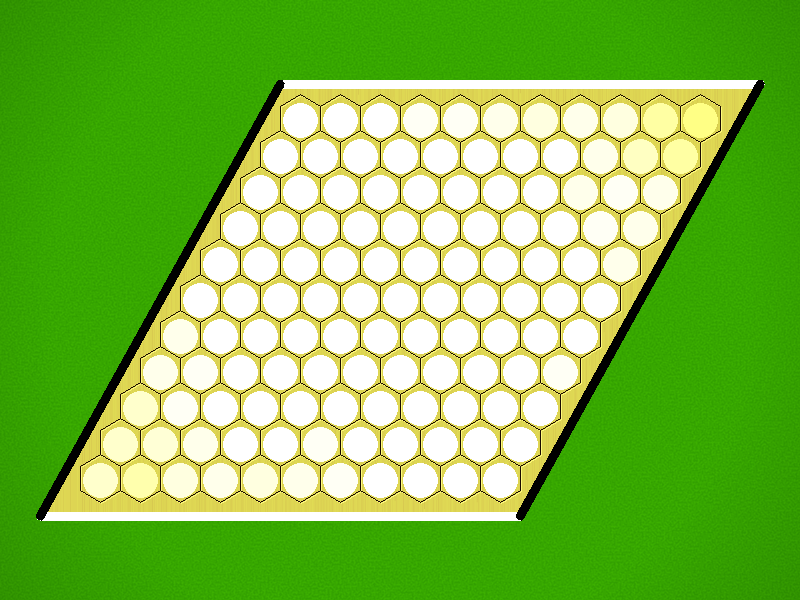
Colour shows the frequency of swaps on turn 2 if this move is played on turn 1; black < red < yellow < white.
Based on 100 trials/move at 0.1s thinking time each.
| Moves | Animation |
|---|---|
| d6,Swap,d7,e7,e6 | 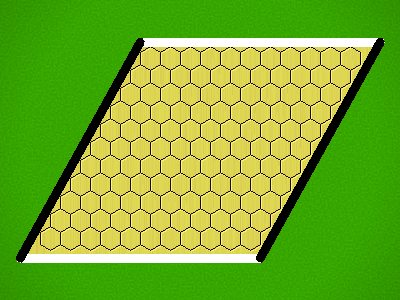 |
| f5,Swap,f6,d7 | 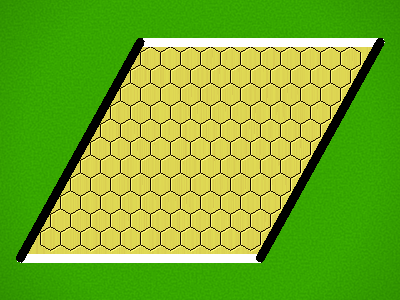 |
| f6,Swap,f5,g5 | 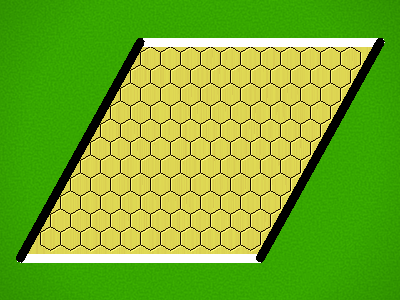 |
| c9,Swap,f7,d7 | 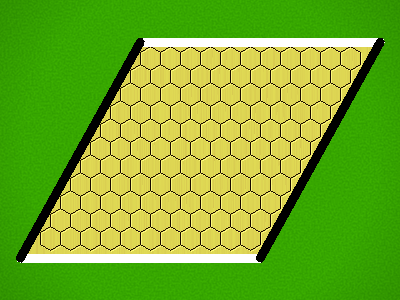 |
| h5,Swap,g6,h6 | 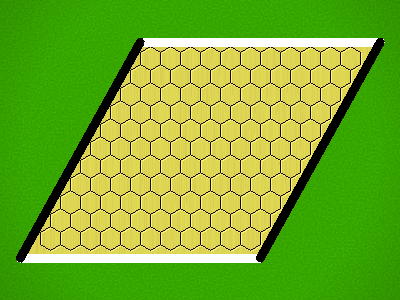 |
| d6,Swap,d7,e7 | 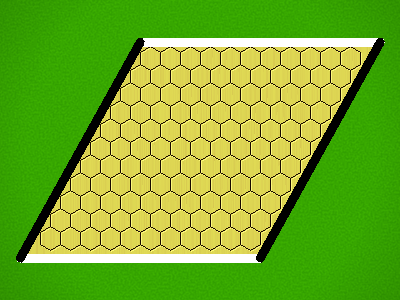 |
| f6,Swap,f4,g4 | 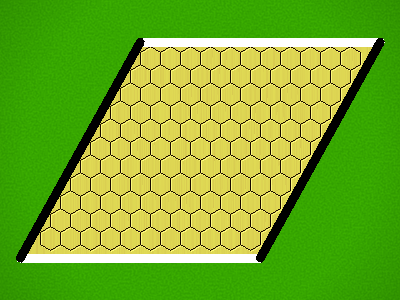 |
| g6,Swap,g4,h4 | 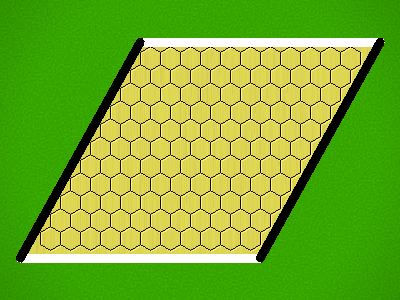 |
| e8,Swap,h4,g4 | 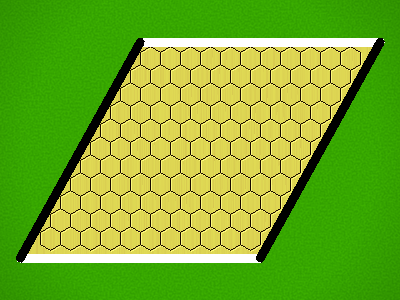 |
| b9,Swap,b4,e7 | 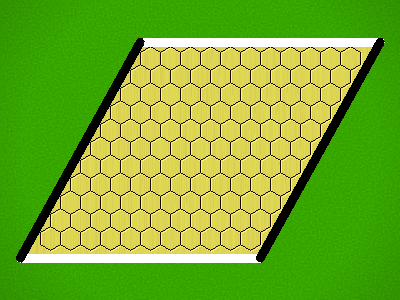 |
| g4,Swap,g5 | 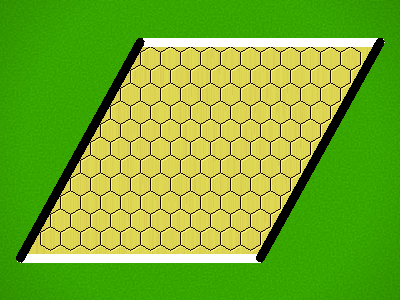 |
| i4,Swap,g5 | 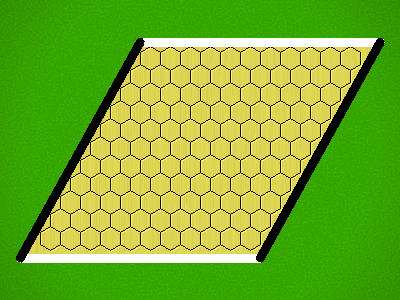 |
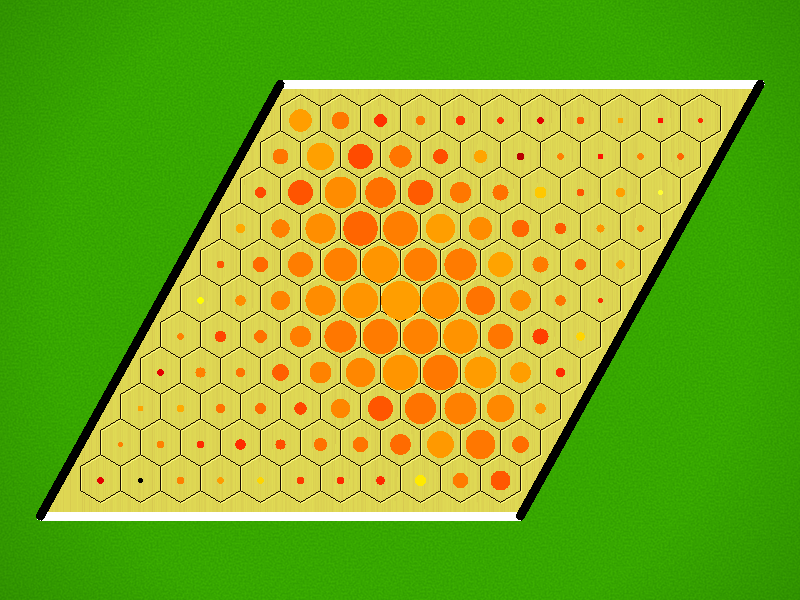
Colour shows the success ratio of this play over the first 10moves; black < red < yellow < white.
Size shows the frequency this move is played.
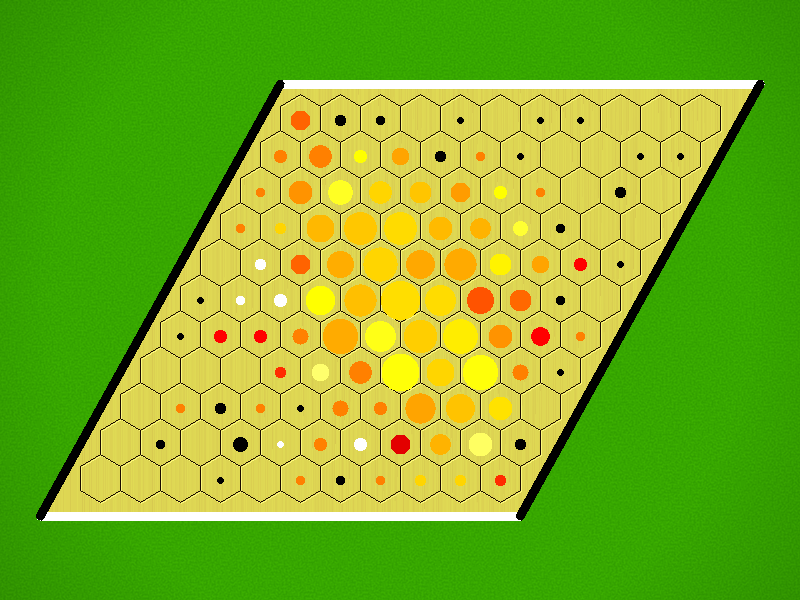
Colour shows the frequency of swaps on turn 2 if this move is played on turn 1; black < red < yellow < white.
Size shows the frequency this move is played.
| Puzzle | Solution |
|---|---|
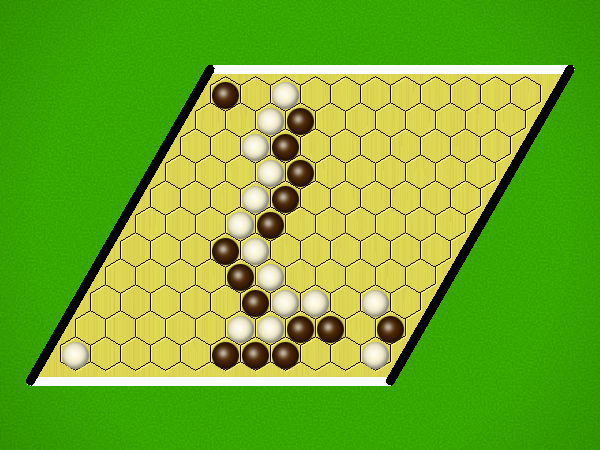 Player 1 (White) to win in 11 moves | |
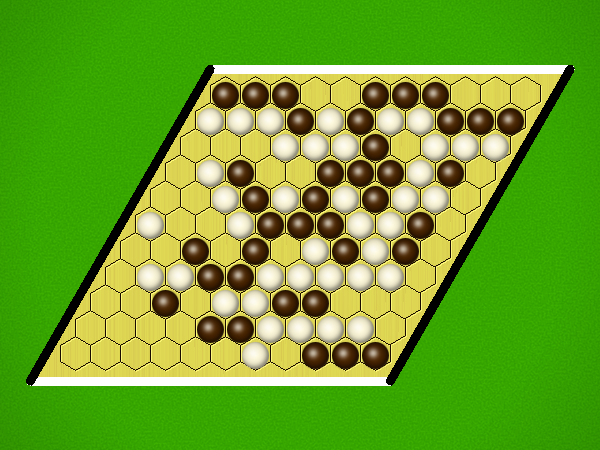 Player 1 (Black) to win in 7 moves | |
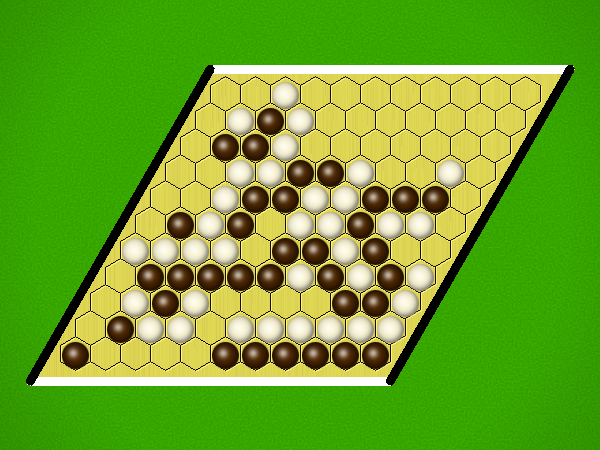 Player 2 (Black) to win in 3 moves | |
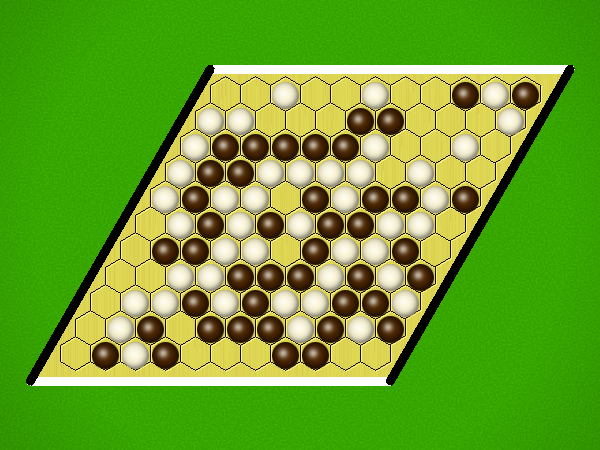 Player 1 (White) to win in 7 moves | |
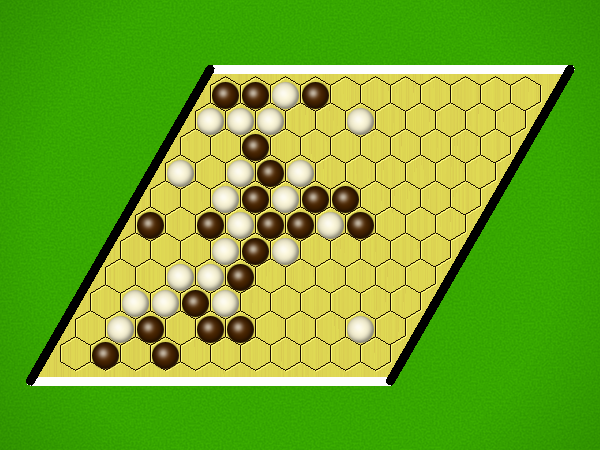 Player 1 (White) to win in 5 moves | |
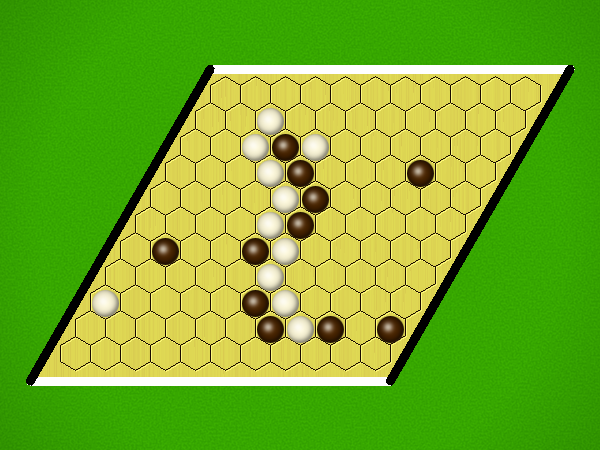 Player 2 (White) to win in 3 moves | |
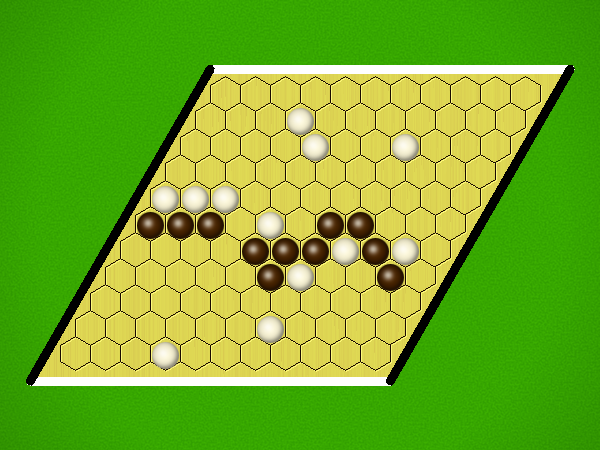 Player 2 (Black) to win in 3 moves | |
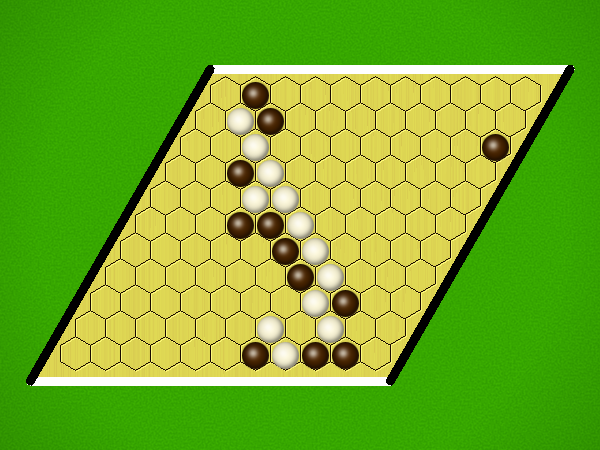 Player 1 (White) to win in 3 moves | |
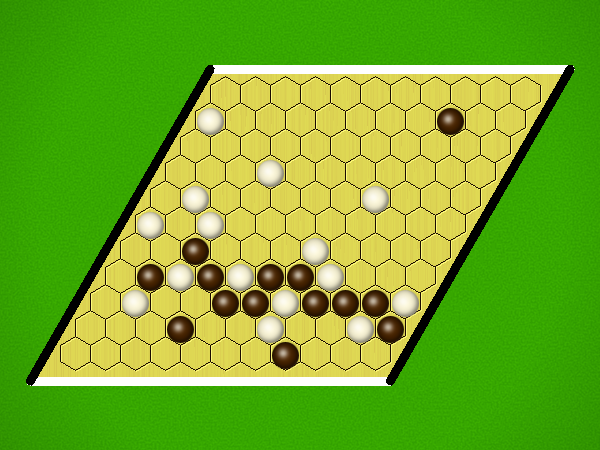 Player 2 (Black) to win in 3 moves | |
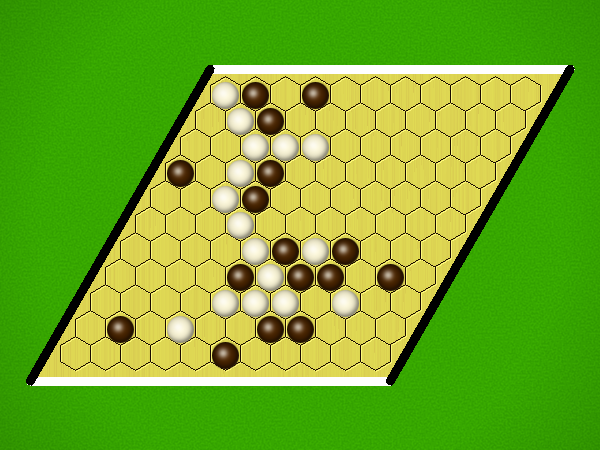 Player 1 (White) to win in 3 moves | |
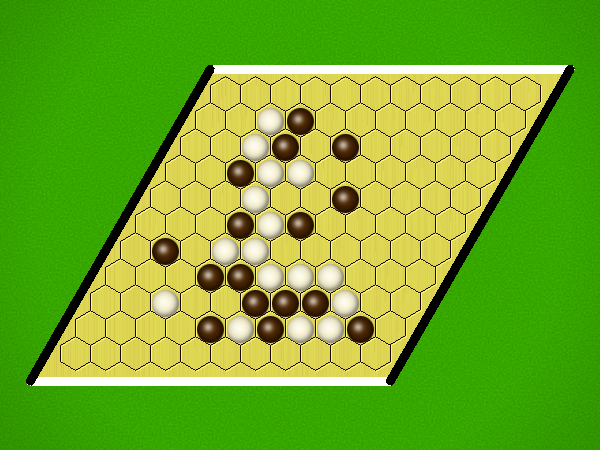 Player 1 (White) to win in 3 moves | |
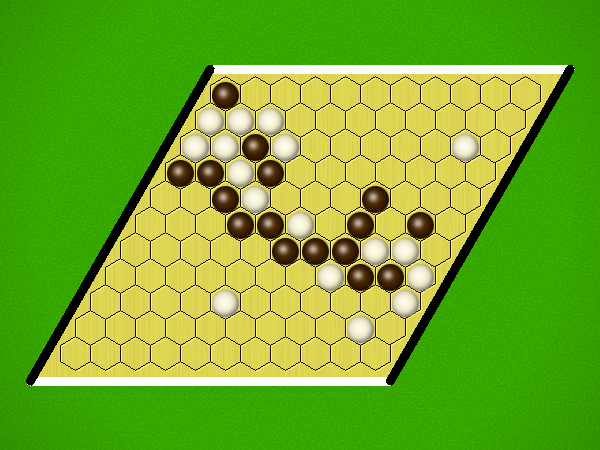 Player 2 (Black) to win in 3 moves |
Weak puzzle selection criteria are in place; the first move may not be unique.